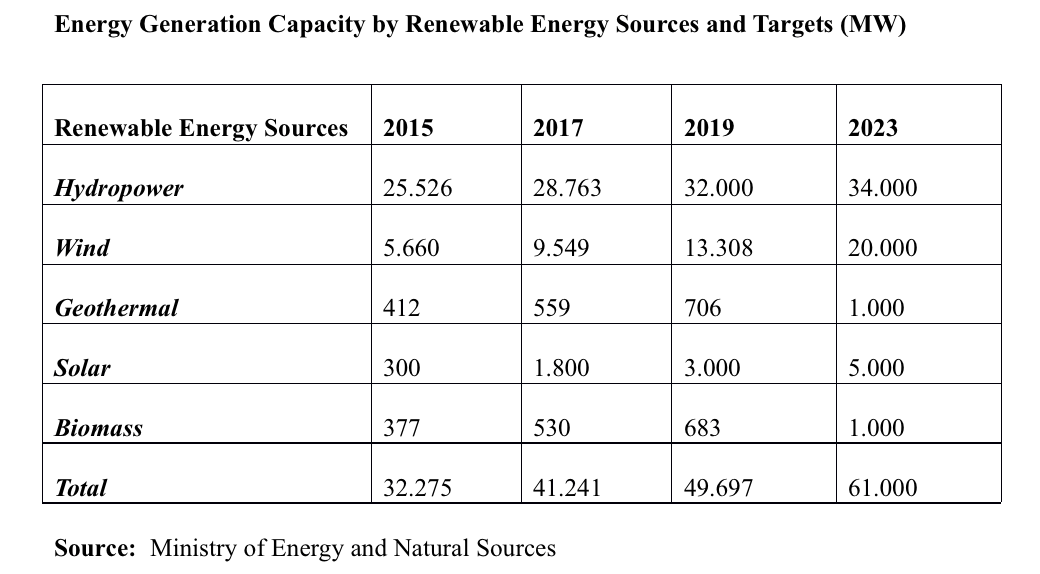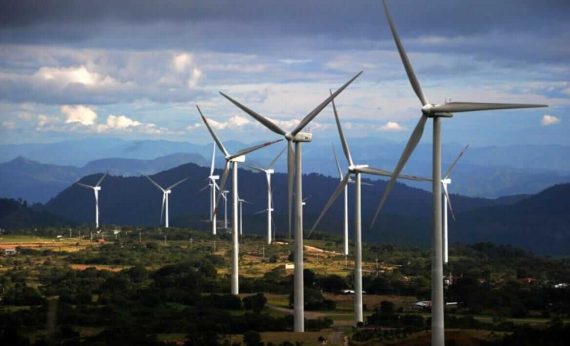After the first oil shock in 1973, the importance of energy was understood better by individuals and institutions. In the following decades, countries have started to diversify their energy resources and use alternative energy sources. Specifically, energy importing countries have embarked on a quest for sustainable energy. In the 2000’s, seeking alternative energy resources accelerated and studies on renewable energy have also increased in the world.
Recommended
Under its National Renewable Energy Action Plan, Turkey is aiming to increasetotal capacity from renewables to 61,000 MW by 2023. 34,000 MW of this total installed capacity will be composed of hydropower; 20,000 MW of wind power, 1,000 MW of geothermal, 5,000 MW of solar and 1,000 MW of biomass energy. The total predicted cost of this goal is nearly 60 billion dollars.

In light of these targets, the share of renewable energy (excluding hydro) in electricity production is planned to be 30 percent in 2023. Although this share is only 10 percent today, the annual growth rate shows that the targets for 2023 may be achieved. The predicted electricity demand for Turkey is going to double by 2023. Under this assumption, the target of a 30 percent renewables share in total electricity generation is going to be a necessity for Turkey.
On the 100th anniversary of the founding of the Republic of Turkey, the forecasted gross electricity production for hydropower will be 91,800 GWh, for wind power 50,000 GWh, for geothermal 5,100 GWh, for solar power 8,000 GWh and for biomass 4,533 GWh. In total, the gross electricity production using renewable energy sources will reach nearly 159,433 GWh. This quantity will be 37 percent of the predicted electricity consumption in 2023 (424 TWh). The target of net electricity production by renewables will be 127,324 GWh (30 percent).
With electricity demand doubling in Turkey by 2023, the use of local, renewable and alternative energy resources should be encouraged by the government. This is very important for countries like Turkey in order to decrease foreign energy dependency.
In addition, the efficient use of energy plays a key role. According to the government’s Energy Efficiency Strategy Paper 2012-2023, by the year 2023, the amount of energy consumed per GDP in Turkey is expected to decrease at least 20 percent from the base year 2011. This means that Turkey has a target to save at least 20 percent of its energy consumption by 2023.
Turkey is a suitable place for using almost all of the renewable energy sources in terms of its geographical location as well as geological structure, and the government has noticed this. On the other hand, technological improvements in the field of renewable energy need to be considered as soon as possible. In addition to this, there are financial constraints in the way of increasing production from renewable energy sources. To overcome these difficulties, the government has developed a number of policies, including a guarantee of a fixed price, investment incentives, support from important international institutions, financial guarantees for renewable energy projects, advisory support, and a tax exemption for bio-fuels.
For the upcoming period, Turkey is following a multi-pronged approach in its strategy for renewable energy. Turkey seeks to encourage the production and consumption of renewable energy sources in order to decrease dependency and risk from using fossil fuels. The goal is to increase the share of renewables to at least 30 percent in the production of electricity. To do this, current production capacity from renewable sources will be expanded, and new sources such as bio-fuels will be encouraged in order to utilize more of the agricultural sector’s potential.
Meeting its energy needs will be crucial for Turkey to meet its broader 2023 goals, and this means the country needs to diversify its energy sources and encourage the use of renewable energy.





